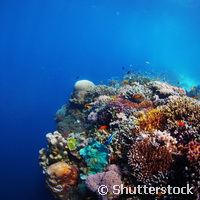Tracking the effects of ocean warming for the survival of coral species
Scientists believe that many coral species - which are important for sustaining tourism, fishing and human activity - may not survive beyond the end of this century. Evaluating the effects of ocean warming and acidification on the future of corals and reefs is then crucial for more than 50 tropical countries and their coastal communities. This issue is addressed by the project CORALWARM, ('Corals and Global Warming: the Mediterranean Versus the Red Sea'), funded by the European Research Council (ERC). By combining field and laboratory experiments on Mediterranean and Red Sea coral species, it aims at generating projections of temperate and subtropical coral survival under conditions of increasing sea temperature and acidification. The five-year research project is being carried out by a team of Israeli and Italian scientists led by Professor Zvy Dubinsky, a leading researcher of aquatic photosynthesis at Bar-Ilan University, alongside coral biologist Stefano Goffredo and chemist Giuseppe Falini, who are experts in bio-mineralisation, at the University of Bologna, Italy. Within the CORALWARM project, Professor Dubinsky's team developed a new instrument that promises to help determine the health status of aquatic plants and corals in response to environmental change and stress. Professor Dunbinsky was awarded an ERC Proof of Concept (PoC) grant to try to bring this new technology closer to the market. The ECHOGREEN (PoC) is an innovative photoacoustics-based instrument, which according to scientists represents a new class of handheld submersible tools. It enables timely detection of the deterioration of reef communities and the destabilisation of marine and aquatic ecosystems. It can also provide early warning signs of any contamination within the drinking waters of lakes, rivers and reservoirs. This innovative technology could, for instance, support coastal authorities responsible for monitoring algal and coral populations, marine labs, nature reserve administrations, water supply authorities and installations based on high-rate-algal sewage treatment system. Furthermore, the algal conversion of solar energy into biofuel could be optimised, as well as algal culturing for pharmaceuticals and fine chemicals. The CORALWARM project was awarded an ERC Advanced grant of around EUR 3 million. The ECHOGREEN project received a Proof of Concept grant of close to EUR 150 000.For more information, please visit: CORALWARM project website http://www.coralwarm.eu/(opens in new window) ECHOGREEN 'Proof of Concept' Grant Bar-Ilan University http://www1.biu.ac.il/indexE.php(opens in new window) European Research Council (ERC) http://erc.europa.eu/(opens in new window)
Countries
Israel



